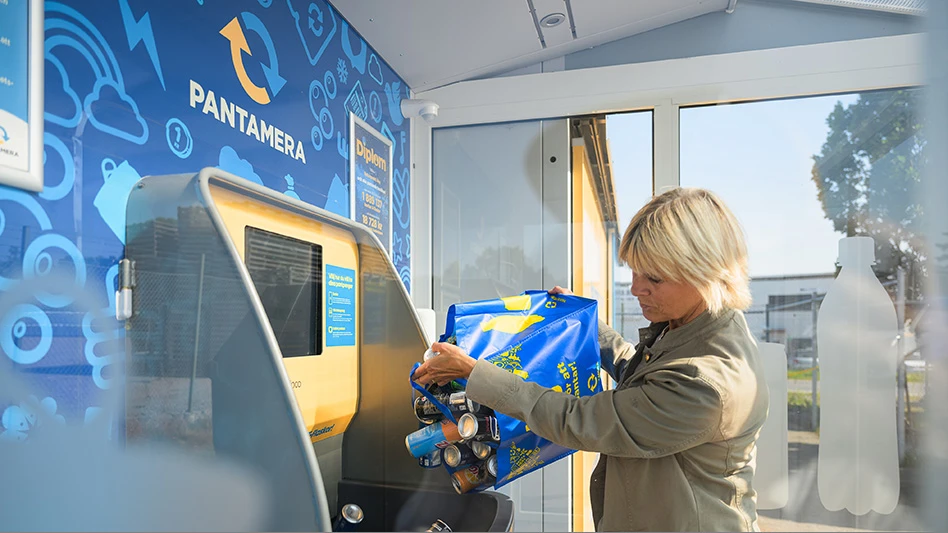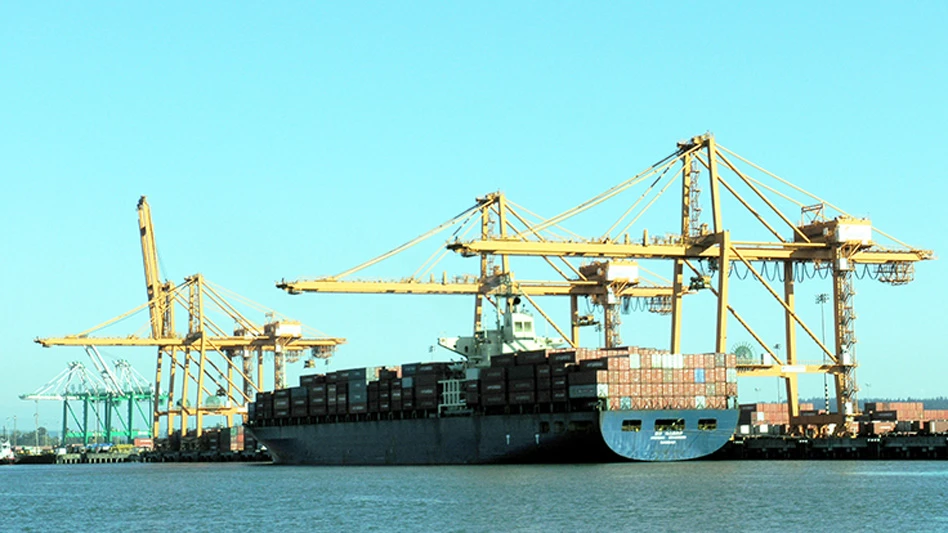 The right truck scale can help a scrap yard comply with weight regulations out on the road and keep profit margins in the black.
The right truck scale can help a scrap yard comply with weight regulations out on the road and keep profit margins in the black.
When shopping for scales, recyclers should look for models that are relatively easy to maintain and fit into the space constraints of their yards. Recyclers have a lot of choices when shopping for a new scale—axle, full length, tool steel, concrete deck, etc.—for their operations.
Scrap yard operators also may want to consider additional features when shopping for their truck scales, such as automated ticketing and digital collection options.
Joe Grell, vice president of heavy capacity for Rice Lake Weighing Systems, Rice Lake, Wis., offers the following advice to recyclers who are shopping for truck scales.
Recycling Today (RT): What is the difference between a full-length scale and an axle scale? Which type do you find recyclers using most often? Why?
Joe Grell (JG): Axle scales are non-legal-for-trade weight estimators, and full-length scales are typically legal-for-trade, can be used to determine commercial transactions and are more accurate than axle scales. Axle scales are valuable in determining if a vehicle is close to or over legal highway loading regulations. They are a cost-effective precautionary scale to ensure that vehicles are not sent out on public highways over legal load limits. Full-length legal-for-trade scales are available in configurations that weigh axles individually and provide commercial accuracy at the same time.
RT: How many styles (low-profile, pit, full electronic, concrete deck, steel deck, etc.) of full-length scales are there? Is there one style you’d recommend for use in the recycling industry? What advantage does it offer?
JG: Vehicle scales are commonly available with either steel or concrete decks. Concrete decks are more durable and will generally outlast steel deck scales. Steel deck scales install quickly and do not require a cure time before they can be used. The finished cost is similar.
Most modern scales are above-ground designs, are fully electronic and the most popular are steel-deck configurations. They are low profile (16 inches to 18 inches above ground), and can be placed on a slab or pier foundation.
|
The Right Fit A scrap yard will need to provide an area that is twice the length of the scale and twice the width of the scale when installing an above ground scale, scale suppliers say. Pit-style scales lay flush and require less space than above-ground scales. Jonathan Sabo is vice president of marketing for Cardinal Scale Manufacturing Co., Webb City, Mo. He says in typical truck scale installations:
Saboa says Cardinal’s SnapStream Wireless Truck Scales, which offer wireless radio frequency connectivity between the truck scale and the weight indicator in the scale house, require a shorter installation time. “Additionally, all peripheral equipment such as remote displays, PCs and printers may be connected wirelessly with SnapStream, which potentially saves thousands of dollars in installation costs,” he adds. “SnapStream is a fully integrated NTEP (National Type Evaluation Program) legal-for-trade wireless scale system for commercial recycling applications allowing connectivity up to 1 mile line of sight between the truck scale and scale house.” |
Another popular pit scale is the side-rail design, named for the two heavy steel I-beams on either side of the scale. Most of these are concrete and are more durable than typical flat-top above-ground scales. They are also slightly more expensive. Pit-type scales are placed in the ground so that the surface of the scale is even with the surrounding road or lot surface. Most mechanical scales are pit type and are the least common scale offered today.
A good choice for the recycling industry is the above-ground steel-deck scale. It is a cost-effective solution that can be moved as the enterprise grows and changes.
RT: What other features should recyclers look for in a truck scale?
JG: Data collection options are very important. Look for a full-service provider with a comprehensive product line. Automated ticketing, kiosks at the scale, messaging systems and remote displays are all important options that allow operators to reduce labor costs and improve throughput for their enterprise. Automated ticketing also keeps drivers in the truck where they are safe. Most accidents involving drivers happen when drivers are outside their vehicles.
RT: How concerned should recyclers be about the load cells used in the truck scales they are considering for purchase?
JG: Load cells are either tool steel or stainless steel, analog or digital. All legal-for-trade scales have the National Conference on Weights and Measures’ (NCWM) NTEP- (National Type Evaluation Program-) approved load cells that perform to commercial standards in a wide variety of environments.
The most important consideration is replacement availability. Many digital load cells are proprietary and only available from one source. This allows the provider to make replacement parts very expensive. Analog load cells are available from a wide variety of sources and this competition keeps replacement costs affordable. Make sure maintenance and service parts are available from several local service providers, not just the company that sold the scale initially.
RT: How much should a recycler be prepared to spend on a truck scale?
JG: Prices for complete installations are based on the length of the scale and include scale and the foundation, site prep and final calibration of the system. Prices are somewhat consistent throughout the United States and Canada. A typical 70-foot-by-11-foot above-ground installation will cost $60,000 to $80,000, depending on options, quality and site development requirements.
RT: What preventive maintenance is necessary for scales used in recycling applications?
JG: Many manufacturers offer diagnostic systems that email both the service provider and user of any maintenance issues with a scale. If this is not available, the scale should be inspected a minimum of once per year and four to 12 times per year in higher volume applications.
All scales should be kept clean at all times. Debris buildup around the scale can impede the accuracy of the scale and often cause the scale to report less weight than is actually on the scale. If a scale has bumper bolts or check rods, these must be adjusted by a professional service provider a minimum of twice per year and perhaps more often in some areas of the country.
Sponsored Content
Labor that Works
With 25 years of experience, Leadpoint delivers cost-effective workforce solutions tailored to your needs. We handle the recruiting, hiring, training, and onboarding to deliver stable, productive, and safety-focused teams. Our commitment to safety and quality ensures peace of mind with a reliable workforce that helps you achieve your goals.
Look for scales designs that do not require bumper bolts or check rods to avoid this added maintenance concern.
Pit scales must be properly ventilated and have proper drainage systems.
Keep scales clean and dry to ensure proper performance.
RT: How often does a scale need to be calibrated? What factors can affect how often scales need to be calibrated?
JG: Inspection and calibration requirements depend on the volume of use, the value of the commodity being weighed and the commercial requirements or the regulatory requirements where the scale is installed. The local service provider will offer a service plan or contract that will ensure proper operation of the scale. Take time to review the inspection and calibration reports each time a scale is serviced.
Compare reports from a historical perspective. If a scale has to be adjusted each time it is serviced, there may be a problem with a component of the scale. Frequent adjustments may indicate the need for more frequent service or, in some cases, replacement of the scale.
The scale is your cash register. You must be confident of proper performance of the scale to maximize profitability in your enterprise. Above all, seek out a service provider that you trust, can count on when emergencies occur and one that will provide weighing solutions that grow with your company.
Joe Grell is the vice president of heavy capacity for Rice Lake Weighing Systems (www.ricelake.com), based in Rice Lake, Wis.
Get curated news on YOUR industry.
Enter your email to receive our newsletters.

Explore the July 2012 Issue
Check out more from this issue and find your next story to read.
Latest from Recycling Today
- Nucor expects slimmer profits in early 2025
- CP Group announces new senior vice president
- APR publishes Design Guide in French
- AmSty recorded first sales of PolyRenew Styrene in 2024
- PRE says EU’s plastic recycling industry at a breaking point
- Call2Recycle Canada, Staples Professional expand partnership
- Circular Services breaks ground on north Texas MRF
- Tariff uncertainty results in choppy nonferrous scrap flows








